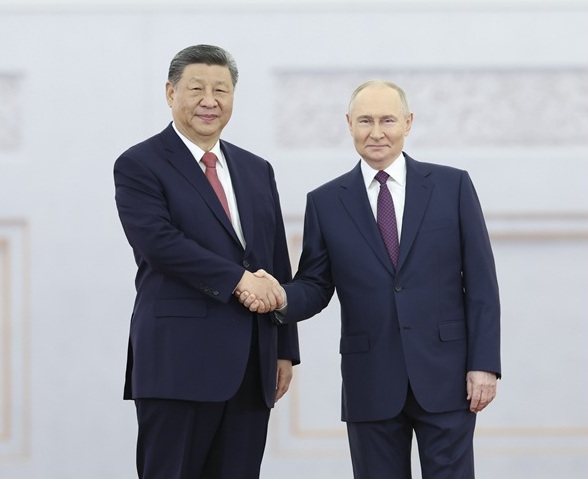Putin and Xi: Talks (and tensions) behind the parade
During Chinese President Xi Jinping’s three-day visit to Moscow, the "Power of Siberia-2" gas pipeline—vital to Russia’s economy—was once again a topic of discussion. Beijing is already supporting Russia’s expanding military production by supplying microelectronic components blocked by Western sanctions. The presence of Chinese soldiers in the parade before Lenin’s mausoleum also reflects internal political considerations within China.
Moscow (AsiaNews) – In the grand spectacle of the Red Square parade marking the 80th anniversary of Victory in the Great Patriotic War, Xi Jinping’s presence stood out as one of the most significant moves in bolstering Vladimir Putin’s image.
While many heads of state from “brotherly” and friendly nations were in attendance, they were clearly overshadowed by the Chinese leader. However, Xi’s visit to Moscow, which began on 7 May and lasted three days, should not be seen purely as ceremonial; it was marked by a packed agenda of high-level talks and strategic negotiations.
The Kremlin’s top priority remains the construction of the "Power of Siberia-2" pipeline, considered crucial for preventing the collapse of Russia’s economy. Thus far, the Chinese have remained non-committal.
The importance of the project was highlighted by Putin’s aide, Yury Ushakov, who reiterated plans to link gas fields on the Yamal Peninsula in north-western Siberia to China via Siberia and Mongolia, reaching the Xinjiang region and north-western Chinese provinces.
This pipeline, a joint initiative between Russia’s declining energy giant Gazprom and China’s CNPC, would allow Russia to export at least 50 billion additional cubic metres of gas annually, while enabling China to reduce its reliance on expensive liquefied gas imports.
Russian sinologist Alexei Chigadayev explained to Currentime that Xi’s visit to Moscow represents a highly unusual and significant diplomatic event for China.
The inclusion of Chinese troops in the parade in front of Lenin’s mausoleum, he noted, was partly aimed at reassuring Chinese public opinion by showcasing China’s role in a powerful international military alliance.
Chinese media has recently published several pieces praising the global admiration for the People’s Liberation Army—an attempt to distract from recent scandals involving military corruption, which led to the disappearance of several defence ministers, and to restore public confidence.
Chigadayev also stressed the symbolic importance of the visit, describing it as “killing two birds with one stone”: strengthening ties with Russia while also sending a strong message to domestic audiences. In light of rising tensions with the United States and the worsening situation with Taiwan, military preparedness is increasingly relevant in China’s public discourse.
At the end of April, China also occupied Sand Cay island in the South China Sea, a territory contested with Vietnam. Nevertheless, Xi has refrained from expressing outright support for Russia; even in an article published in Rossiyskaya Gazeta on the eve of his visit, he focused on the “historical perspective of cooperation between the two nations from past to future,” glossing over more immediate political and economic concerns. In Kremlin meetings, he even urged Putin to “seek a just peace with Ukraine”.
In reality, Russia and China are conducting joint military and naval drills, as well as strategic manoeuvres, while allowing large numbers of Chinese volunteers to enlist in Russia’s military effort in Ukraine. It is also claimed that “China is backing Moscow’s most ambitious military build-up since the Soviet era”, providing drone and missile technologies, satellite imagery, and industrial machinery for arms manufacturing.
According to US intelligence, in 2023, 90% of Russia’s microelectronics imports came from China, enabling the large-scale production of ballistic missiles, tanks, and military aircraft—yet only a few Chinese companies involved have been hit by Western sanctions.
Another timely issue is the potential rapprochement between China and the European Union, catalysed by Donald Trump’s tariff war. A China-EU summit is being planned for this summer, where Xi could position himself as the sole credible mediator, even in Europe’s dealings with Russia.
Many issues remain unresolved, particularly around energy supplies. China is considering all options, including possible Gazprom deals with the Americans—something Beijing would prefer to prevent with Europe’s help, thereby offering Putin tangible prospects for cooperation.







.png)










